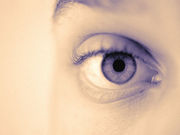Rates of worsening low in patients receiving aflibercept, bevacizumab, or ranibizumab
THURSDAY, April 27, 2017 (HealthDay News) — Three anti-vascular endothelial growth factor (anti-VEGF) treatments are associated with low rates of diabetic retinopathy (DR) worsening, according to a study published online April 27 in JAMA Ophthalmology.
Susan B. Bressler, M.D., from Johns Hopkins University, and colleagues conducted preplanned secondary analysis of data from a comparative effectiveness trial for center-involved DME in 650 participants during two years of treatment with aflibercept (2 mg), bevacizumab (1.25 mg), or ranibizumab (0.3 mg).
The researchers found that at one year, among 423 nonproliferative DR (NPDR) eyes, 44 of 141 (31.2 percent) treated with aflibercept, 29 of 131 (22.1 percent) with bevacizumab, and 57of 151 (37.7 percent) with ranibizumab had improvement of DR severity (P = 0.004 for aflibercept versus bevacizumab, P = 0.01 for ranibizumab versus bevacizumab, and P = 0.51 for aflibercept versus ranibizumab). At two years, no treatment group differences were identified. Among the 93 eyes with proliferative DR (PDR) at baseline, one-year improvement rates were 75.9 percent for aflibercept, 31.4 percent for bevacizumab, and 55.2 percent for ranibizumab (P < 0.001 for aflibercept versus bevacizumab, P = 0.09 for ranibizumab versus bevacizumab, and P = 0.02 for aflibercept versus ranibizumab). These rates and group differences were maintained at two years.
“All three anti-VEGF treatments were associated with low rates of DR worsening. These data provide additional outcomes that might be considered when choosing an anti-VEGF agent to treat DME,” conclude the authors.
Several authors report financial ties to the pharmaceutical industry.
Copyright © 2017 HealthDay. All rights reserved.








